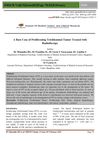Search
for
Sort by
Research
360-390 / 1000+ results
research Potential Etiological Factors in Frontal Fibrosing Alopecia
The exact cause of frontal fibrosing alopecia is unknown, but it's not likely due to sunscreen.

research Argyria in a Patient with a Delusional Disorder
A man with a mental disorder turned his skin blue-gray by drinking silver to treat warts.

research Treatment of Diseases Associated with Cicatricial Alopecia
The document concludes that there are various treatments for diseases linked to scarring hair loss, especially for primary scarring alopecia.

research A Case of Unilateral Congenital Triangular Alopecia
A 5-year-old boy was diagnosed with congenital triangular alopecia, a type of hair loss without skin changes, usually starting between ages 2-5, with no specific treatment.

research Principles of Management of Women with Hirsutism: A Dermatologist’s Perspective
The conclusion is that hirsutism in women can be managed with hair removal techniques, medications, and topical treatments.
research Alopecia Areata, Morphea, and Psoriasis: Clinical Features, Pathogenesis, and Treatment Options
Early diagnosis and treatment are crucial for managing alopecia areata, morphea, and psoriasis.

research Periungual Lesions Secondary to Chemotherapy with Docetaxel
Chemotherapy with docetaxel can cause painful nail and skin side effects that may lead to stopping treatment.

research Autoimmune Polyglandular Syndrome Type 4 – Case Report
Patients with one autoimmune disease should be checked for other autoimmune disorders.

research Type 3 Autoimmune Polyendocrine Syndrome Diagnosed in an 87-Year-Old Patient with Concomitant Chronic Autoimmune Urticaria
An 87-year-old woman was diagnosed with type 3 autoimmune polyendocrine syndrome and had multiple autoimmune issues.

research Cutaneous Lupus Erythematosus: Diagnostic and Therapeutic Recommendations of the Polish Dermatological Society
The Polish Dermatological Society recommends personalized treatment for cutaneous lupus, including lifestyle changes, medications, and monitoring, with specific drugs for severe cases.

research A Study on the Efficacy of 308 nm Excimer Light Therapy in Alopecia Areata
308 nm excimer light therapy may help hair regrowth in alopecia areata with delayed results and no serious side effects.

research Comparative Study of Efficacy of Excimer Light Therapy vs. Intralesional Triamcinolone vs. Topical 5% Minoxidil for Alopecia Areata: An Observational Study
Intralesional triamcinolone is the most effective treatment for alopecia areata, followed by excimer light therapy, and then topical minoxidil. The scalp responds better to treatment than the beard area.

research Evaluation of Hair Regrowth in Men with Androgenetic Alopecia Treated with Autologous Platelet-Rich Plasma
Platelet-rich plasma treatment can effectively promote hair regrowth in men with androgenetic alopecia without major side effects.

research The Use of Minoxidil in Diseases Associated with Hair Loss
Minoxidil, a medicine initially for high blood pressure, can stimulate hair growth and is promising for treating hair loss, but it may cause side effects like itching and dizziness.
research Knowledge About Androgenetic Alopecia Among Women and Men – A Survey Research
Women know more about androgenetic alopecia than men.
research Shame and Self-Esteem in Androgenic Alopecia Patients
Higher self-esteem in men with androgenic alopecia leads to less shame and more openness.

research Androgenetic Alopecia as a Cardiovascular Risk Factor
Hair loss may increase heart disease risk.
research Trichosporon Asteroides: A Novel Etiological Agent of Kerion Celsi in a Child
A child's scalp infection was caused by a fungus not previously known to do so, but it was successfully treated.
research Serum 25-Hydroxy-Vitamin D and Vitamin B12 Levels in Childhood Alopecia Areata
Children with Alopecia Areata often have lower vitamin D and B12 levels and higher thyroid activity.

research Clinico-Pathological Correlation in Indian Women Presenting with Cutaneous Features of Hyperandrogenism: A Cross-Sectional Study
Indian women with skin signs of high male hormones often have related health issues.
research Fulminant Systemic Vasculitis in Systemic Lupus Erythematosus: Case Report and Review of the Literature
Early diagnosis and quick treatment are crucial for severe lupus cases.

research Role of Nutrition in the Management of Polycystic Ovary Syndrome
A balanced diet and healthy lifestyle help manage PCOS symptoms.

research Impact of Vitamin D Supplementation in PCOS and Non-PCOS Patients
PCOS patients, especially obese ones, often lack vitamin D and may need supplements and lifestyle changes.

research A Rare Case of Proliferating Trichilemmal Tumor Treated with Radiotherapy
Radiotherapy effectively treated a large scalp tumor in an elderly woman, avoiding surgery.

research Medicine Update
The CDC reports 23 measles cases in unvaccinated US kids, new treatments for eosinophilic esophagitis and osteopenia are approved, poor sleep may cause migraines, atopic dermatitis could lead to asthma, migraines might increase Crohn's disease risk, cancer may raise heart disease risk, gout is linked to prostate issues, Cabo Verde is malaria-free, social factors and vitamin D affect dementia risk, smoking increases hair loss risk, certain drugs might lower thyroid disease risk in arthritis, noma is a neglected disease, and meal timing could impact heart health.

research Evidence-Based Case Report of Alopecia Areata Treated with Fluoric Acid
Homeopathic treatment may help manage alopecia areata.

research Ayurvedic Management of Madarosis: A Case Report
Ayurvedic treatment helped a woman regrow her lost eyebrow and eyelash hair.

research Long-Term Outcomes of Microneedling and CGF on Hair Regrowth in Patients with Androgenetic Alopecia: A Clinical Evaluation
Microneedling with CGF significantly improves hair regrowth in androgenetic alopecia.

research A 15-Year-Old Female Patient Diagnosed with Systemic Lupus Erythematosus and Initially Presented with Lupus Nephritis, Cerebritis, and Diffuse Alveolar Hemorrhage
Early recognition and treatment of severe SLE symptoms can improve outcomes.